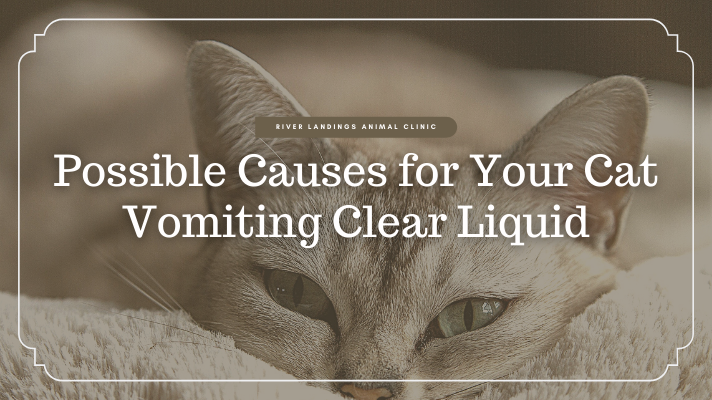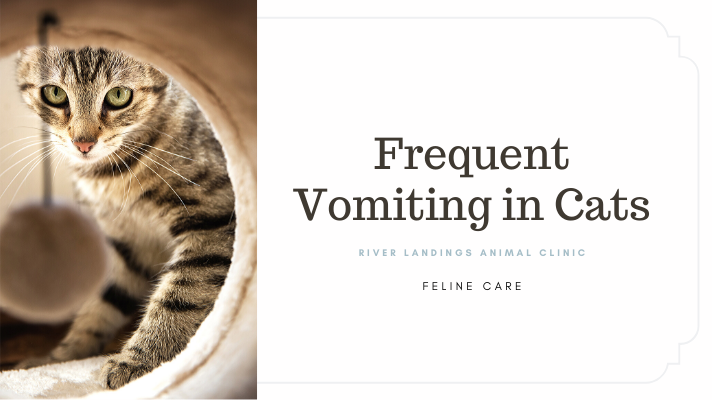Vomiting is not normal in cats, and when your cat vomits clear liquid, it can be a sign of a serious illness. Vomiting itself is what is considered to be a nonspecific symptom. It could be associated with an array of health concerns. Some of these can include things like hairballs, internal obstructions, pancreatitis, eating too quickly, constipation, indigestion, parasitic infections, poisoning, stress, depression, or even anxiety.
Possible Causes for Your Cat Vomiting Clear Liquid
Hairballs
Cats are naturally meticulously clean animals and groom themselves for a large part of their day. As your cat grooms themselves, tiny hook-like structures on their tongue catch loose and dead hair, which is then swallowed. The majority of the hair passes all the way through the digestive tract with no problems, but sometimes the hair stays in the stomach and forms a hairball.
Commonly, cats will vomit up clear liquid prior to a hairball. Although, a cat vomiting up clear liquid with a hairball occasionally can be normal and not a concern, it is important to note that hairballs should not be frequent, painful, or difficult for your cat to pass. Some commercial cat diets and treats are formulated to help prevent formation of hairballs. Adopting a regular brushing schedule and getting your cat comfortable with brushing can also help get rid of any loose fur in your cat's coat that they may otherwise ingest when grooming themselves.
Food and Dietary Changes
When there is a change in your cats feeding schedule, if your cat misses a meal or eats later than normal, your cat may vomit up clear liquid.
In addition, you may have switched your cat’s food too quickly. When changing your cat to a new diet, it is recommended to do it gradually over a one to two-week period gradually decreasing the amount of current cat food while increasing the amount of new cat food.
Your cat may eat too quickly, and this can cause clear vomit or clear vomit with food present. If you cat is a habitual 'scarf and barf' cat or if they have intestinal sensitivities, that may be causing them to vomit up partially digested or undigested food. If your vet has ruled out other medical issues and thinks that what your cat is vomiting up is actually food, they may want you to try a food for sensitive stomachs with your cat. If your cat is still struggling with vomiting food on this special diet, they may then want to put your cat on a strict, hydrolyzed protein diet.
Your vet may also suggest food puzzles for your cat. Food puzzles are a great source of both play and enrichment for your cat. There are more and more manufactured food puzzles available on the market that stimulate both of your cat's predatory and foraging instincts. The added benefit of food puzzles for a cat that chronically vomits their food, though, is that it slows down the chow time so that a cat cannot eat too quickly and then get sick from it.
Indigestion
Just like in people, a cat's stomach produces various gastric juices as well as hydrochloric acid to digest their food. If, however, a cat skips a meal for some reason, or if they are not fed on time, that buildup of juice and acid can irritate the stomach and cause your cat to vomit. Cats with indigestion may vomit yellow foam in addition to white foam. If you and your vet suspect your cat's vomiting is from indigestion, your vet may suggest feeding small, frequent meals at the same time throughout the day so as to alleviate any buildup of stomach acid.
Gastritis
If your cat is one to get into things they shouldn't, it is possible that they have irritated their stomach with something that they have eaten. When this happens, you may see vomiting clear liquid in addition to vomiting blood and/or bile. Your cat may also be exhibiting a decrease in appetite, a depressed attitude, lethargy, or dehydration. Your vet will know just what to do if your cat is vomiting because of gastritis.
Some other causes can include:
Parasites
Constipation
An obstruction of foreign material in the intestinal tract
Ingesting a toxin
Metabolic disorders such as diabetes, kidney disease, and hyperthyroidism
What Should I Do if My Cat Is Vomiting Clear Liquid?
Some cat owners may describe their cat as 'puke-y' but it should be noted that frequent vomiting is never normal for a cat. Vomiting more than once a week is definitely a sign of issues. If your cat is vomiting clear liquid several times and/or in conjunction with other symptoms such as lack of appetite, weight loss, lethargy, or diarrhea, you should make an appointment with your vet right away. Your vet will want to start with a physical exam, checking your cat's vital signs and palpating your cat's abdomen. After a thorough examination, your vet may also want to run some tests, including blood work and x-rays. Blood work will check your cat's organ function, making sure that there are no signs of liver disease or kidney disease, as well as your cat's red blood cell and platelet levels. An x-ray study will check for any fluid in the abdomen that could potentially be blood and it may also show intestinal gas patterns that could be indicative of a blockage.
Depending on what your doctor finds, your cat may require hospitalization for fluid therapy and supportive care, or they may just need outpatient treatments and oral medications to go home on. If your vet suspects your cat has an intestinal blockage your cat may require surgery to remove whatever the blockage is.
Hear From Us Again
Don't forget to subscribe to our email newsletter for more recipes, articles, and clinic updates delivered straight to your e-mail inbox.
Related Categories:


